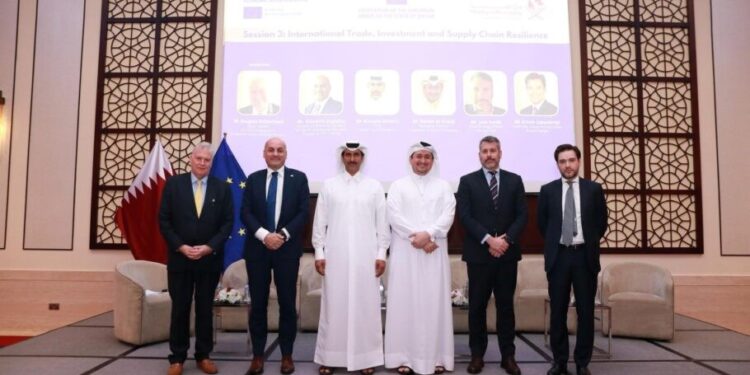The event “Forging Qatari-EU Partnerships for Sustainable Food Security” concluded successfully, gathering officials, experts, and industry leaders from Qatar and the European Union to strategize on improving food security and building resilient food systems. Organized by the EU-GCC Dialogue on Economic Diversification Project in partnership with Qatar’s Ministry of Municipality and the EU Delegation, the event focused on fostering innovation, boosting trade relations, and finding collaborative solutions to shared challenges in agriculture and food production.
Two panel discussions, “Innovations in Sustainable Agriculture” and “Strengthening International Trade and Resilient Food Supply Chains,” highlighted advanced agritech solutions such as hydroponics, aquaponics, and renewable energy integration in agriculture. Participants explored how to overcome trade barriers to ensure stable food supplies.
H.E. Dr. Cristian Tudor, EU Ambassador to Qatar, stressed the importance of collaboration:
“Food security is a global challenge requiring global solutions. The EU is committed to partnering with Qatar to foster innovation in agritech and sustainable farming, guided by the European Green Deal and Farm to Fork Strategy. Together, we can strengthen Qatar’s food security and promote environmentally sustainable practices.”
Dr. Jarallah Al Marri, Director of the Food Security Department at the Ministry of Municipality, emphasized Qatar’s progress:
“Qatar has made significant strides in food security despite environmental challenges. Our 2024-2030 strategy focuses on self-sufficiency, technological integration, and resilient food supply chains. Learning from the EU’s sustainable agriculture experience will help us achieve these goals.”
The event underscored the role of innovation in sustainable agriculture, with experts sharing insights on how Qatar and the EU can leverage technologies like data-driven agriculture and precision farming to boost productivity while minimizing environmental impacts. Discussions also addressed building resilient food supply chains and reducing trade barriers to facilitate smoother agricultural trade relations.
This event marked a crucial step in deepening Qatar-EU ties, creating new opportunities for collaboration and investment in the agricultural sector, and reinforcing joint efforts toward long-term food security.
























































